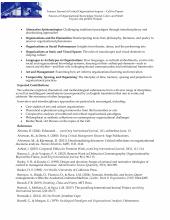Eric K. Austin; Ryan Rouse
2022 19 ( 1 ) DOI: 10.7206/tamara.1532-5555.11
|
Rob Warwick; Pete Burden
|
Mohammad Manki
Wyświetleń2725 Pobrań1009
|
Chris Land
|
Heather Hopfl
|
Heather Hopfl
|
Kenneth N. Ehrensal
|
Iiris Aaltio
|
Isleide A. Fontenelle
|
Amy L. Fraher; Yiannis Gabriel
|





